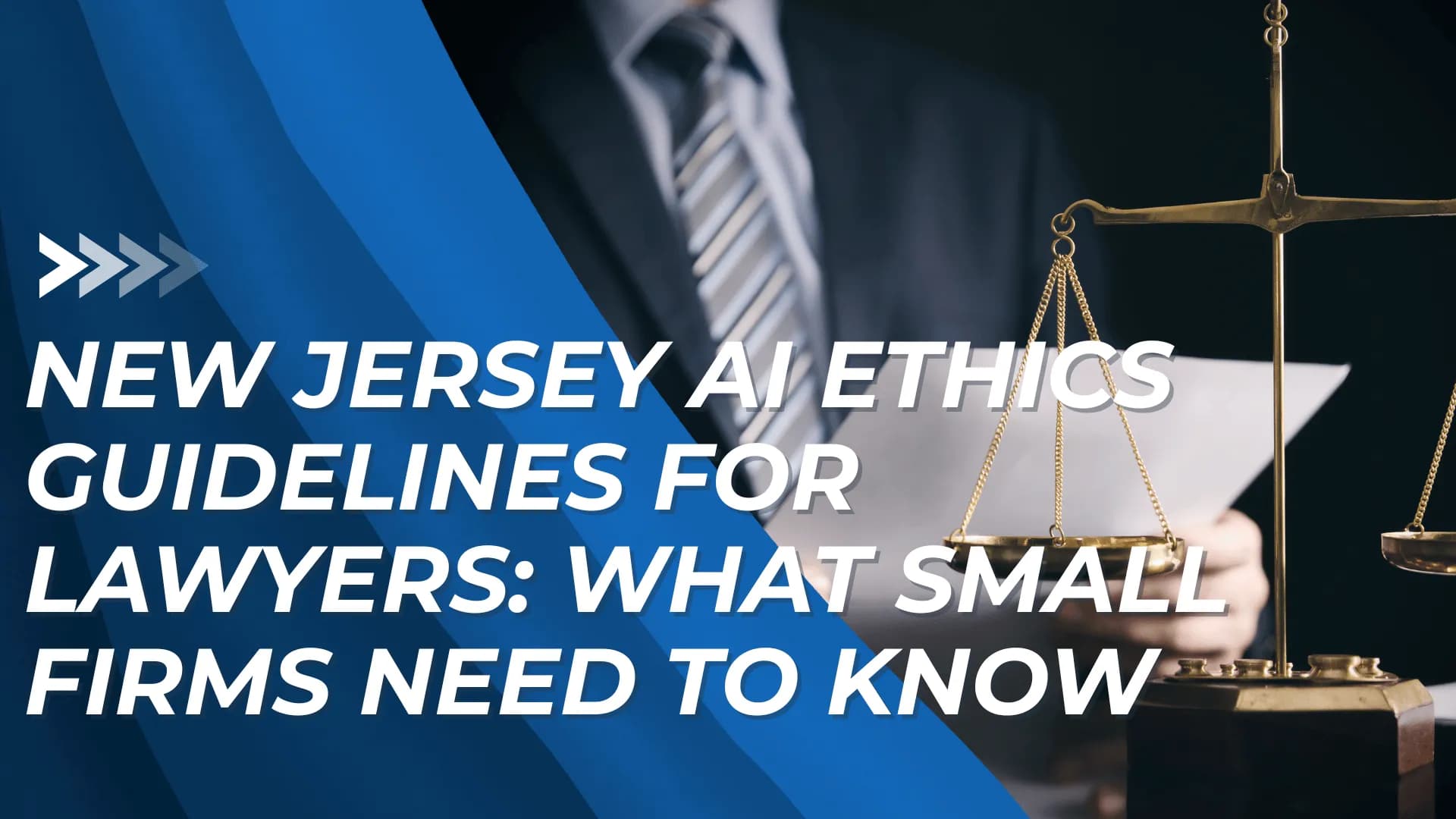New Jersey AI Ethics Guidelines for Lawyers: What Small Firms Need to Know

AI is reshaping legal practice in unprecedented ways. For small firm attorneys, these powerful tools offer competitive advantages—but they also present ethical challenges that could harm client trust or potentially trigger disciplinary proceedings if not handled properly.
As a solo practitioner or small firm owner without dedicated compliance departments, you're responsible for navigating these waters yourself. Let's examine New Jersey's guidelines and what they mean for your day-to-day practice.

What Are the New Jersey AI Guidelines?
In January 2024, the New Jersey Supreme Court Committee on Artificial Intelligence and the Courts issued preliminary guidelines addressing AI use by attorneys. This diverse committee drew expertise from practitioners, judiciary members, technology specialists, and academic experts.
The guidelines primarily address generative AI technology—systems that produce text or images using predictive models built on extensive datasets. They acknowledge that AI will soon become an unavoidable element of legal practice while recognizing both its promise and potential pitfalls.
These are intentionally labeled as "preliminary" guidelines, with the expectation that more comprehensive directions will follow as our understanding of AI capabilities and limitations evolves.

AI Accuracy and Truthfulness Requirements In New Jersey
A primary concern with generative AI is its potential to create plausible-sounding but factually incorrect information. This directly impacts several ethical obligations:
- RPC 3.1 requires a non-frivolous basis in law and fact for legal positions
- RPC 4.1(a)(1) prohibits false statements of material fact or law
- RPC 8.4(c) forbids conduct involving dishonesty or misrepresentation
New Jersey's guidelines emphasize that attorneys bear full responsibility for verifying all AI-generated content. The obligation to ensure accuracy rests entirely with the lawyer, regardless of how convincing the AI output might appear.
Technology solutions like Clearbrief can support this verification process by automatically checking citations against source documents and identifying potential inconsistencies, helping you maintain ethical compliance without manual cross-referencing.

Client Communication and Disclosure Considerations
Regarding client disclosure, the New Jersey guidelines take a balanced approach. You aren't required to notify clients of every AI use, but disclosure becomes necessary when:
- Your client specifically inquires about AI use
- The client needs this information to make informed decisions about representation
- Understanding your AI use is necessary for the client to comprehend your approach
While AI can assist in client communications under RPC 1.4, the guidelines emphasize that attorneys must supervise these interactions and ensure their accuracy.
For smaller practices where personal relationships drive business, thoughtful transparency about your AI implementation can actually strengthen client confidence by demonstrating your commitment to both innovation and ethical practice.

Confidentiality and Data Security
The guidelines emphasize that confidentiality protections under RPC 1.6 fully extend to AI use. Attorneys must take "reasonable efforts to prevent inadvertent or unauthorized disclosure" of client information when utilizing AI systems.
Given the proliferation of AI tools with varying security standards, the responsibility falls on attorneys to evaluate system security before inputting any confidential client information.
Consider implementing these safeguards:
- Thoroughly assess vendor data practices and retention policies before use
- Remove client identifiers when using general-purpose AI systems
- Communicate your AI usage policies in client agreements when appropriate
- Select legal-specific tools with robust security credentials, such as those with SOC-2 certification and strong data protection protocols like Clearbrief

Oversight Responsibilities
The New Jersey guidelines specifically address supervision requirements. Under RPCs 5.1-5.3, attorneys—particularly those in leadership roles—must ensure ethical AI use throughout their organizations, including by:
- Other attorneys in the practice
- Support staff and paralegals
- Students, interns, and temporary workers
Even in small practices, consider implementing:
- A straightforward written AI policy tailored to your firm's needs
- Periodic discussions about ethical AI use during team meetings
- Designating someone to monitor AI developments and tool evaluation
- Creating standard procedures for reviewing AI-generated content
- Revisiting your protocols as technology and guidance evolve
Specialized legal AI tools like Clearbrief that provide evidence-linking capabilities can help satisfy these oversight obligations by creating clear verification trails without extensive manual documentation.

Potential Impact on Billing and Advertising
The guidelines acknowledge that AI adoption will influence billing practices (RPC 1.5) and potentially marketing claims (RPC 7.2), though detailed guidance in these areas remains forthcoming.
For smaller practices competing with larger firms, consider these approaches:
- Maintain transparency about time actually devoted to AI-assisted tasks
- Clearly explain any AI-related expenses in advance
- Explore alternative fee arrangements for AI-enhanced services
- Distinguish between firm-wide AI investments and client-specific expenses
- Avoid charging clients for your learning curve with new technologies

Conclusion: Balancing Innovation and Ethics
New Jersey's guidelines deliver a clear message: while AI tools change, your core ethical obligations remain constant. The rules simply apply in new contexts.
By focusing on verification procedures, appropriate client communication, data security, and effective supervision, you can confidently incorporate AI while maintaining ethical standards.
Stay connected with developing guidance, and when questions arise, remember the Attorney Ethics Hotline is available at (609) 815-2924.
For small practice attorneys, the thoughtful integration of ethically-designed AI tools represents an opportunity to enhance service quality and efficiency while upholding professional responsibilities—positioning your practice for success in a rapidly evolving field.

